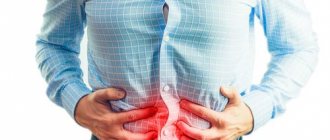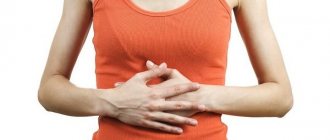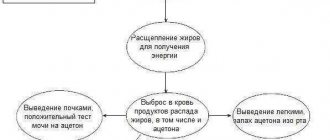Irritable bowel syndrome
This term includes a whole group of functional digestive disorders. In this case, pathological conditions are not associated with organic damage directly to the intestine. It is customary to speak of a syndrome when its characteristic symptoms do not disappear for 3 or more months.
The main reasons for the development of the pathological condition:
- psycho-emotional instability;
- changing your usual diet;
- prolonged exposure to stress;
- unbalanced diet: as a rule, people whose diet contains very few foods rich in fiber suffer from irritable bowel syndrome and the accompanying feeling of fullness in the lower abdomen;
- lifestyle that does not involve physical activity;
- gynecological diseases;
- intestinal pathologies of an infectious nature suffered in the recent past;
- hormonal imbalance.
Under the influence of any provoking factor, the degree of sensitivity of intestinal receptors decreases. The consequence of this is a disruption of its functioning.
The main symptoms of the syndrome are pain and a feeling of fullness in the abdomen. They occur against the background of muscle spasms and excessive stretching of the intestinal walls. In most cases, the patient's condition improves slightly after defecation and the passage of gas.
The syndrome requires an integrated approach to treatment. Therapy is aimed at normalizing the psycho-emotional state and relieving painful sensations.
Treatment of heaviness in the stomach
If stomach discomfort begins to appear more often, then you need to seriously think about treatment. To do this, contact a specialist, undergo diagnostics, and understand the causes of the ailment. The doctor will select the necessary ways to restore health.
Ways to improve the functioning of the digestive system:
- adjust your diet: establish regularity of food intake, avoid overeating, starvation, improve the quality of foods consumed;
- play sports, do exercises, move more;
- drug therapy;
- use of traditional methods of treatment.
Each of these methods is important for improving the functioning of the digestive system.
Intestinal obstruction
This condition is not an independent disease. In all cases, it develops against the background of other pathologies of the digestive system. In addition, central nervous system disorders may be the cause.
The term “intestinal obstruction” refers to an acute condition in which the passage of feces through the final section of the digestive tract is difficult.
Reasons for the development of pathology:
- various types of injuries;
- helminthic infestations;
- presence of a foreign body in the intestine;
- diseases of the digestive system;
- intoxication process;
- recent surgery on the digestive system;
- constriction with intestinal loops (for example, adhesions;
- narrowing of the lumen of mesenteric vessels;
- neoplasms of both benign and malignant nature.
The following symptoms are characteristic of intestinal obstruction:
- painful sensations that are cramping in nature;
- feeling of heaviness and fullness in the stomach;
- constipation;
- flatulence;
- cardiopalmus;
- pale skin;
- excessive sweating.
Treatment of pathology is carried out using both conservative and surgical methods. The choice of patient management tactics directly depends on the cause of the disease and its severity.
Why there is a feeling of heaviness and fullness in the stomach
A feeling of heaviness and fullness in the stomach occurs when there are disturbances in the functioning of the digestive system. These symptoms indicate poor nutrition, for example, starvation, overeating, poor quality food. If the discomfort does not go away or recurs, then most likely a pathology occurs in the body.
Causes of feeling of heaviness and fullness in the stomach:
- toxicosis during pregnancy;
- diseases of the digestive system;
- metabolic disorders, such as diabetes;
- stressful situations;
- allergic reaction to food;
- alcohol abuse, smoking;
- lactose intolerance;
- parasite infection.
Any of these reasons causes discomfort and pain in the digestive organs.
Unpleasant feeling in the morning
If heaviness in the stomach appears in the morning. Such hunger pains most often appear at 5 o'clock in the morning. If symptoms appear regularly, then consulting a doctor should not be delayed.
Heaviness in the morning appears with the following diseases:
- stomach and duodenal ulcers;
- gastritis.
A glass of milk or clean water will help relieve discomfort.
After meal
A feeling of heaviness and fullness in the stomach after eating is most often associated with the quality of food and other dietary disorders. Besides this, there are other reasons.
Symptoms of this condition:
- pregnancy;
- binge eating;
- fatty, heavy foods;
- the presence of harmful substances in products, for example, nitrates;
- reaction to medications;
- gastritis;
- stomach ulcer;
- pancreatitis;
- cholelithiasis;
- stomach cancer.
It is necessary to adjust your diet and remove all foods that irritate your stomach. If the pain recurs, then visit a specialist who will select a diagnosis and treatment.
Heaviness in the stomach and nausea
If heaviness and nausea appear immediately after eating, then this is due to overeating or poor quality food. You can do without the help of a doctor; first of all, you need to adjust your diet and avoid foods that irritate the gastric mucosa.
If foods that irritate the stomach are excluded from the diet, and the pain recurs and does not go away for a long time, then most likely the body is signaling the development of diseases.
Heaviness in the stomach and nausea can be symptoms of the following diseases:
- gastritis;
- peptic ulcer;
- dyspepsia;
- food poisoning;
- pancreatitis.
Read: Stomach lymphoma - symptoms, diagnostic methods and treatment
We recommend watching the video:
These diseases must be diagnosed and treated by a specialist.
Feeling of heaviness and belching
If an unpleasant belching is added to the feeling of heaviness in the stomach, then this most likely indicates the occurrence of pneumatosis. With this disease, there is too much air in the stomach.
Symptoms of pathology:
- feeling of pressure, heaviness;
- strong, loud belching;
- pain in the heart area may occur.
Unpleasant sensations appear after eating and decrease after belching. The doctor will help you correctly determine the causes of discomfort and select methods of complex therapy.
In addition, belching can occur in pregnant women. In this case, these symptoms are associated with natural processes occurring in the body.
Some foods, such as carbonated drinks, can cause belching.
Chronic pancreatitis
This disease is a common cause of a feeling of fullness in the abdomen. The term “pancreatitis” refers to inflammation of the pancreas. The chronic form of the disease develops when the acute phase is not stopped in a timely manner.
The main causes of pathology:
- regular consumption of alcoholic beverages;
- unbalanced diet;
- the presence of stones in the gallbladder;
- hormonal imbalance;
- various types of pancreatic injuries;
- genetic predisposition.
Clinical manifestations of chronic pancreatitis:
- frequent episodes of belching;
- diarrhea or, on the contrary, constipation;
- nausea, often turning into vomiting;
- bloating and feeling of fullness;
- increased degree of fatigue;
- a sharp decrease in body weight;
- flatulence.
The disease is often complicated by conditions that pose a danger not only to the health, but also to the life of the patient. In this regard, it is necessary to consult a doctor when the first alarming signs occur (stool disorders, feeling of fullness in the abdomen). With timely treatment, it is possible to achieve a period of stable remission.
Diagnosis of the stomach
To begin with, you can carry out the diagnosis at home yourself. It consists of the following activities.
- Lie on your stomach and relax the abdominal muscle structures.
- Place your palm where your stomach hurts.
- Try to feel it.
- Pay special attention to the presence or absence of asymmetry in the subcostal region.
If during the manipulation some kind of lump is felt, then you need to visit a doctor.
To identify pathology, the doctor pays attention to the following points:
- nature of formations;
- shape with smooth or uneven edges;
- seal mobility;
- presence of pain syndrome.
Attention is also drawn to accompanying symptoms. In case of acute pain, urgent surgical intervention is required.
After this, he prescribes an examination, which may include:
- ultrasound diagnostics;
- X-ray with contrast;
- urine, blood and stool tests;
- fibrogastroduodenoscopy;
- colonoscopy;
- magnetic or computed tomography.
After the diagnosis is made, therapeutic therapy is prescribed.
Duodenitis
The course of this disease is accompanied by inflammation of the wall of the duodenum. Duodenitis can be either an independent pathology or combined with other ailments of the digestive system.
The main reasons for the development of the disease:
- active activity of the bacteria Helicobacter pylori;
- abnormalities of intestinal development;
- hormonal disorders;
- unbalanced diet, frequent consumption of unhealthy foods;
- smoking;
- abuse of alcoholic beverages;
- prolonged exposure to stress;
- uncontrolled use of certain medications;
Symptoms characteristic of duodenitis:
- pain and feeling of fullness in the upper abdomen;
- general weakness;
- increased body temperature;
- nausea;
- vomit;
- headache;
- sudden changes in body weight.
Therapeutic measures are aimed at stopping the inflammatory process. Patients must strictly adhere to the diet and dosage regimen of medications prescribed by the doctor.
What to do if you have bloating in your stomach?
Treatment of bloating and flatulence is carried out taking into account the cause that caused the occurrence of unpleasant symptoms. If the pathological causes of increased accumulation of gases in the intestines are not identified, treatment is carried out using carminative drugs (defoamers), diet and traditional medicine recipes.
Drug treatment
Carminatives, which destroy intestinal gas bubbles, prevent their formation and facilitate the removal of the gas mixture from the intestines, are the main group of drugs used to treat flatulence and relieve heaviness in the abdomen. There are four groups of drugs with similar properties that exhibit antifoam properties, but contain different active ingredients.
Carminatives for bloating and heaviness in the abdomen
| Active substance | Drugs | Effect | Dosage |
| Simethicone | "Espumizan" "Bobotik" | Inhibits the formation and destroys gas bubbles in mucus and nutrient suspension of the gastrointestinal tract | 40-80 mg 3 to 5 times daily |
| Bromopride | "Bimaral" | Normalizes motility of the digestive tract, eliminates nausea, stops vomiting, relieves hiccups and flatulence | 5-10 drops/kg (divided into 2 doses) |
| Fennel fruit | Dill water "Plantex" | Stimulate the secretion of gastric juice, normalize digestion, enhance intestinal motility, eliminate increased gas formation | Dilute 5-10 g in 50-100 ml of water and take 2-3 times a day |
| Dimethicone | "Zeolate" "Gaskon Drop" | Reduce the surface tension of the components of the gas mixture | 80-160 mg up to 3-4 times a day |
If necessary, therapy can be supplemented by taking sorbent drugs (“ Smecta ”, “ Polifepan ”, “ Polysorb ”).
Treatment of flatulence
Diet
From the diet of patients suffering from bloating and heaviness in the abdomen, it is necessary to exclude any foods that can stimulate gas formation: radishes, confectionery, cabbage, cucumbers, carbonated drinks, fresh baked goods. The diet should contain a sufficient amount of fiber (cereals, fruits, herbs, berries, vegetables), fermented milk products and proteins. It is recommended to prepare dishes in a gentle way, using boiling, stewing and baking. Fruits and vegetables are best consumed fresh, if necessary, peeling them and grinding them into a paste or puree.
Sample menu for patients with bloating and heaviness in the stomach
| Eating | Dishes |
| Since morning | Steam omelette with cherry tomatoes, herbs and boiled chicken; Mint tea |
| Late breakfast | Curd pudding with bananas; fruit juice |
| Dinner | Chicken broth with wheat croutons and chicken meatballs; buckwheat cutlets with beef; fig compote without sugar |
| Afternoon snack | “Farmer” salad with boiled pollock; a sandwich made from whole grain bread with low-fat cheese; chamomile drink |
| Before bedtime | A glass of kefir (if you are very hungry - a little cottage cheese or a piece of boiled fish) |
Nutrition for intestinal flatulence
Gastritis
Inflammation of the stomach lining is also a common cause of abdominal distension. The development of pathology is triggered by regular exposure of the stomach to powerful irritants.
Main provoking factors:
- active life of Helicobacter pylori;
- regular consumption of alcoholic beverages;
- smoking;
- uncontrolled use of medications;
- infections of viral and fungal nature;
- malfunction of the immune system;
- lack of vitamins.
main clinical manifestations of gastritis:
- stomach pain regularly;
- feeling of fullness;
- nausea;
- belching;
- heartburn;
- unpleasant taste in the mouth;
- general weakness;
- arrhythmia;
- constipation or, on the contrary, diarrhea;
- vomit;
- drowsiness.
Treatment of pathology involves taking medications and strictly following a diet.
How is diagnosis carried out?
Before prescribing additional types of research, the doctor palpates the abdomen.
Before starting additional studies, the attending physician should examine the patient, palpate the abdomen and ask him about his usual diet. Diagnostics consists of the procedures presented in the table:
| Type of study | What does it show? |
| Blood analysis | Hemoglobin amount |
| Course of the inflammatory process | |
| Breath test | Detects the microorganism Helicobacter pylori |
| Ultrasound | Deforming changes in the internal organs of the gastrointestinal tract |
| FGDS | Condition of the gastric mucosa |
| X-ray | External state of the gastrointestinal tract |
| MRI | Detects malignant tumors |
Pyloric stenosis
This disease is characterized by difficulty in the passage of partially digested food into the intestinal cavity. This is a consequence of the narrowing of the pyloric outlet.
Reasons for the development of the disease:
- scars formed at the site of prolonged ulcers;
- neoplasms located on the inner walls of the stomach and duodenum.
At the initial stage of the disease, patients complain of belching with a sour taste, as well as a feeling of fullness in the abdomen. After vomiting, the general condition usually improves. Over time, painful sensations appear, the person’s body weight begins to rapidly decrease. The decompensation stage is characterized by dehydration and exhaustion. In the vomit you can find remnants of food eaten several days ago.
At the initial stage of development of the disease, the use of prokinetics is indicated. These are drugs whose active components restore the motility of the stomach and intestines. In other cases, surgical intervention is indicated.
Feeling of fullness in the stomach without food: what pathologies may be
A feeling of fullness in the stomach can be a symptom of the following pathologies:
- Inflammatory diseases. Bacteria, viruses and autoimmune processes can damage the walls of the digestive tract and disrupt the functioning of the gastrointestinal tract. Such diseases include ulcerative colitis, celiac disease, gastritis and gastroduodenitis. Dyspeptic disorders often cause bloating.
- Fluid retention. Normally, the body constantly eliminates excess fluid through urine. Various disorders can cause fluid retention in the abdominal cavity. These may be liver pathologies and oncological processes.
- Constipation. The large intestine produces feces and removes them from the body within 24 hours. Retention of feces in the intestinal lumen may be associated with impaired motor activity of the intestinal walls and lack of fluid. The accumulation of stool in the intestines also leads to an increase in the amount of gas due to obstruction.
- Food intolerance. Individual metabolic characteristics can cause intolerance to various foods. Intolerance is not an allergic reaction, since this process is associated with impaired absorption of the nutritional component. The most common conditions are gluten and lactose intolerance. In people with this disease, consuming an indigestible product leads to bloating, diarrhea and vomiting.
- Intestinal bacterial overgrowth syndrome . This disease is associated with an imbalance of intestinal bacterial colonies. The cause may be a pathology of the intestinal structure or the proliferation of pathogenic microorganisms. Harmful bacterial colonies produce gas and toxic substances. Characteristic symptoms of the disease include bloating and diarrhea.
- Infection . Bacteria, viruses, fungi and protozoa can damage the cells of the digestive tract and cause various pathologies. In this case, the feeling of bloating may be associated with fluid retention and an increase in the number of white blood cells.
- Intestinal obstruction . If constipation causes temporary and incomplete intestinal obstruction, the obstruction completely blocks the organ. The intestinal lumen may be blocked by scar tissue or tumor. Unlike constipation, obstruction is accompanied by pain, loss of appetite and other dangerous symptoms.
- Stress. A person’s emotions can affect the functioning of the gastrointestinal tract and cause a feeling of a full stomach. Stress usually causes spasms and impaired intestinal motility.
Such a variety of causes can complicate diagnostic measures. As a rule, doctors look for other characteristic signs of diseases.
Stomach ulcer
This disease has a chronic course. It is accompanied by a violation of the integrity of the tissues lining the walls of the stomach.
Causes of peptic ulcer:
- active activity of the bacteria Helicobacter pylori;
- genetic predisposition;
- uncontrolled or prolonged use of NSAIDs;
- violation of metabolic processes;
- atrophic gastritis;
The main symptom of a stomach ulcer is pain localized under the xiphoid process. It can radiate to the left half of the body.
Other clinical manifestations:
- bloating, feeling of fullness;
- the tongue is coated;
- bad breath;
- nausea, often turning into vomiting;
- flatulence;
- bowel disorders.
Treatment of peptic ulcer is carried out using both conservative and surgical methods.
Bloating and heaviness as symptoms of digestive diseases
Most of the pathologies of organs (more than 85%) involved in the digestive processes are manifested by functional dyspepsia, which includes not only bloating and flatulence, but also heaviness, pain in the epigastric and abdominal area, heartburn, nausea, vomiting, problems with appetite . To find out what kind of disease caused indigestion and excessive accumulation of gases, it is necessary to undergo instrumental, hardware and laboratory diagnostics. The patient may be prescribed general blood and urine tests, coprogram, ultrasound of the abdominal organs, endoscopic and radiographic examination of the stomach and intestines and other diagnostic procedures.
Colitis in the cecum
Diseases in which the patient may complain of bloating and heaviness in the abdomen
| Group of diseases | What diseases are included? | Other possible symptoms |
| Stomach diseases | Gastritis (including corrosive, fibrinous and phlegmonous forms). Achylia of the stomach (lack of hydrochloric acid and enzymes). Gastric polyposis. Hypotension of the gastric walls | Pain in the upper abdomen, constipation, heartburn, bad breath, general weakness and drowsiness |
| Bowel diseases | Diverticulitis. Colitis. Enteritis. Duodenitis. Sigmoiditis. Crohn's disease. Irritable bowel syndrome | Impaired defecation, changes in the consistency, color and smell of feces, spasmodic pain in the lower abdomen, increased basal temperature, nausea and vomiting |
| Diseases of the gallbladder and bile ducts | Cholecystitis. Cholangitis. Cholelithiasis (cholelithiasis). Hypotension of the gallbladder. Biliary sludge. Atresia of the bile ducts. Biliary dyskinesia | Yellowing of the skin and mucous membranes, pain in the right hypochondrium of a dull, stabbing or acute nature, severe nausea, belching, vomiting with bile acids |
| Liver diseases | Cirrhosis. Hepatitis. Liver dystrophy. Parasitic liver cysts | Pain in the right upper abdomen, deterioration of health, increased weakness, thirst, jaundice, alternating constipation and diarrhea |
Bloating in the abdomen can also occur with infectious intestinal diseases (including parasitic infections - helminthiasis). Acute intestinal infections of viral and bacterial origin begin with profuse and repeated vomiting or an increase in temperature to 38° and above. Stool with intestinal infections is liquid, has a watery or foamy consistency, and an unpleasant odor. The color of the feces becomes light yellow, olive or green. Severe cramping pain is noted in the abdomen, the clinical picture is complemented by a febrile syndrome.
Symptoms of worms in an adult
Treatment consists of rehydration therapy (salt solutions “ Hidrovit ”, “Regidron”), eradication of the infectious agent (antimicrobial or antiviral agents), drinking plenty of water, and taking sorbents (activated carbon, dioctahedral smectite). For vomiting and severe nausea, taking prokinetics (“ Domperidone ”, “ Motilak ”) is indicated.
If bloating and heaviness in the abdomen are caused by helminthic infestation, deworming is prescribed using antiparasitic drugs ( Pyrantel , Vermox , Levamisole ).
Types of gastrointestinal infections
Feeling full after eating
Every person at least once in his life has experienced discomfort that occurs shortly after finishing a meal. Isolated cases of bloating and a feeling of fullness are associated, as a rule, with banal overeating during a holiday feast or a stressful state.
Other causes of discomfort after eating:
- lack of diet, numerous snacks;
- frequent consumption of foods rich in flavorings, dangerous fats and preservatives;
- too rapid absorption of food: food that is poorly chewed and not sufficiently moistened with saliva negatively affects the functioning of the gastrointestinal tract;
- constant consumption of high-calorie foods;
- intoxication: the process of poisoning the body with harmful compounds starts when consuming low-quality products;
- large portion sizes;
- abuse of fast food and alcoholic beverages.
In order to relieve discomfort, it is allowed to take medications. Safe medications that should be in the first aid kit in every home:
- “No-Shpa;
- "Spazgan";
- "Smecta";
- "Espumizan";
- "Hilak-Forte";
- "Linex";
- "Bifiform".
If the feeling of fullness is localized in the upper abdomen, you can take Pancreatin.
Associated symptoms
How to recognize bloating in the stomach after eating? The feeling of heaviness is accompanied not only by bloating and increased gas formation, but also by a number of other symptoms:
- bloating and increase in size;
- pain syndrome;
- intestinal colic;
- stool disorders;
- occurrence of periodic vomiting.
Signs may not appear at the same time, making diagnosis difficult.
Burning and pain in the abdomen
When a patient experiences heartburn with a characteristic painful attack, it is customary to talk about the release of a large amount of hydrochloric acid. Under the influence of the gastric mixture and food, the valve in the organ relaxes. As a result of this phenomenon, the juice enters the esophagus.
Some foods can cause heartburn in the stomach:
- fatty foods;
- confectionery and chocolate;
- alcoholic and carbonated drinks;
- hot seasonings;
- garlic and onions;
- sour fruits, citrus fruits and juices;
- tomato;
- fried foods.
Short-term painful sensations in the stomach can occur as a result of overeating or during dry snacks. Abdominal discomfort of this nature also occurs due to poisoning. If symptoms appear frequently and do not give you peace, then you need to be examined by a doctor.
Nausea and vomiting
If distension in the stomach area is accompanied by nagging pain, cramps, and vomiting, then the reason lies in the intake of poor-quality water or food. There is a violation of the motor function of the stomach, against the background of which the muscle structures push incompletely digested food back into the esophagus. After this, relief comes.
The cause is abuse of alcohol and nicotine. In some situations, the body reacts to stress in this way.
Bloating, bloating and increased gas production
Doctors warn that quickly swallowing food without chewing is harmful to health.
Bad habits lead to the fact that the digestive tract begins to enlarge from a large amount of gases. First of all, this process affects the intestinal flora. Women often complain about this condition during pregnancy. Signs indicate changes in the hormonal system and compression of internal organs by an enlarged uterine cavity.
Flatulence and bloating are caused by:
- sweets;
- flour products made from wheat and rye flour;
- legumes;
- different types of cabbage.
Against this background, cramps and discomfort occur in the abdomen.
Abnormal bowel movements such as diarrhea or constipation
Even the slightest disturbances lead to changes in the consistency of stool. If the mucous membrane is severely irritated, the patient develops diarrhea. Food is not digested enough and leaves the body immediately. This phenomenon often occurs in the morning after sleep.
Others experience the opposite situation - constipation develops. The passage of feces becomes difficult, resulting in a person having bowel movements once every 3-5 days.
Temperature and weakness
A rise in temperature and the development of dizziness often indicate that a person has consumed low-quality food. Toxins that enter the body cause painful attacks. With severe intoxication, the patient may lose consciousness.
Discomfort during pregnancy
In the early stages, a feeling of fullness in the abdomen may be due to hormonal changes in the body. In addition, discomfort is often a consequence of an unbalanced diet.
A feeling of fullness in the abdomen during pregnancy can also be a symptom of impaired functioning of the pancreas, which cannot cope with the increased load.
Other causes of discomfort:
- non-compliance with drinking regime;
- wearing clothes that are too tight;
- late-night snacks;
- increase in size of the uterus.
If you have a feeling of fullness, you should inform your doctor. It is important to exclude the development of serious diseases of the digestive system.
Stomach bursts
A feeling like bloating in the stomach can be a symptom of various pathologies of the gastrointestinal tract. The internal organs of the gastrointestinal tract are interconnected; if one of them malfunctions, the entire system ceases to function normally. As a consequence of such deviations, unpleasant, uncomfortable sensations arise in different areas of the abdomen.
Other reasons
The feeling of fullness in the stomach is a kind of signal that should not be ignored. If it appears, you should consult a doctor. The specialist will conduct diagnostic measures and draw up a treatment plan.
Other possible causes of discomfort:
- bad habits;
- frequent use of soda to relieve heartburn;
- excess body weight;
- natural age-related changes.
In women, a feeling of fullness in the lower abdomen often accompanies ovulation. When the phase of the cycle changes, it goes away on its own.
To get rid of the feeling of fullness forever, it is necessary to eliminate the root cause of its occurrence.
Diagnostic methods
If discomfort or pain becomes periodic or lasts for several days, then you should consult a doctor. A gastroenterologist deals with these issues.
The following diagnostic methods are used to identify pathologies:
- gastric juice studies;
- stool, urine, blood tests;
- Ultrasound;
- gastroscopy;
- fluoroscopy.
Thanks to these diagnostic methods, a specialist will identify the causes of pain in the stomach. After this, the gastroenterologist will select treatment methods, diet, and medications to effectively eliminate discomfort in the digestive system.










